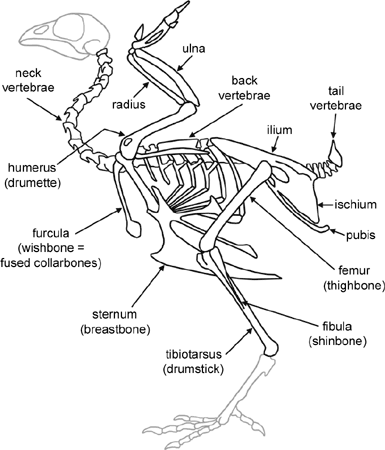An animal with a backbone or spinal column, made up by interlocking bones called vertebrae Source: Shawn Lim
Function of Vertebrae:
Provide support for body structures
Assist in movement
Provide support for and protects the spinal cord
Structure of Vertebrae
Each individual segment of bone has protrusions coming out from the top and sides . Muscles can be attached to the protrusions for movement.
Types of Vertebrates:
Mammals
Examples:
Human,Platypus,Spiny Ant Eater,Hamsters
Characteristics:
Young suckle Has hair on their body,Give birth to their young alive (Expect for Platypus and Spiny Ant eater),Warm Blooded,Has lungs
Birds
Examples:
Vulture,Crow,Turkey,Chicken
Characteristics:
Covered in Feathers,Lays Eggs,Warm-Blooded

Fish
Examples:
Codfish,Koi,Catfish,Salmon
Characteristics:
Scales,Breathe through gills,Cold blooded,Most Fishes lay eggs,but some give birth to live young
Reptiles
Examples:
Gavials,Crocodile,Caiman,Anacondas
Characteristics:
Cold-blooded,Have scales,Lungs,Lays eggs
.jpg)
Amphibians
Examples:
Frogs,Mudskipper,Newts,Salamander
Characteristics:
Cold Blooded,Moist Skins,Can live on both land and water,Lays eggs,Breath through gills
References:
http://www.ucmp.berkeley.edu/museum/events/bigdinos2005/images/turkey_skel.gif
https://blogger.googleusercontent.com/img/b/R29vZ2xl/AVvXsEipE53lQLGDQ_kzUjVPAtJwsrf88CLq5r-jcrIxNfKaOUfl2KIw2RveNOpXFTbvqO704EK8Wj_m6CYGI5aT2iU4qM3HDMqDRbPCtaG8DsBWbbdho51tBHXMl9q5ZD2ERD7TYfRvxTwmAhYo/s400/bone-snake+(2).jpg
Group Members:
James Lim Jing Jie,Shawn Lim JunHe,Tam Wai Hang,Tang Wen Yue
This comment has been removed by the author.
ReplyDeleteI have discovered that some of the vertebrates have cartilaginous skeleton. E.g. Sharks [Chondrichthyes]
ReplyDeleteI learnt the structure of vertebrae and the segment of the bones.
ReplyDeleteI learnt that each individual segment of bone has protrusions coming out from the top and sides . Muscles can be attached to the protrusions for movement.
ReplyDeleteI've learnt that vertebrates have backbones which are made up of interlocking bones called vertebrae. Vertebrae has protrusions to enable the muscle to attach to the vertebrae to assist in movement.
ReplyDeleteVertebrates can be classified into mammals, birds, fish, reptiles and amphibians.
This comment has been removed by the author.
ReplyDeleteI learnt that in the structure of vertebrae each individual segment of bone has protrusions coming out from the top and sides, that fish are cold blooded.
ReplyDelete1. I have learnt that vertebrates have backbones or spinal columns, made up by interlocking bones called vertebrae, where muscles can be attached to the protrusions
ReplyDeleteThis comment has been removed by the author.
ReplyDeleteI learnt the functions of the backbone and that the bone segments of the backbone has protrusions coming out from the top and sides.
ReplyDeleteI have learnt that the most essential part of an vertebrate is the spine, as without it, the animal would be rendered immobile. I've also discovered that animals that do not seem to have a backbone, actually have a backbone. One example is the snake, being able to be so flexible even with a backbone.
ReplyDeletei have learnt that An animal with a backbone or spinal column, made up by interlocking bones called vertebrae, which Provide support for body structures, Assist in movement and Provide support for and protects the spinal cord, and that vertebrates can be classified into 5 different families
ReplyDeleteI have learnt that a vertebrae can be classified into different groups such as mammals, fish, birds, reptiles and amphibians and the structure of a vertebrae.
ReplyDeleteI have learnt that a vertebrate is an animal with a backbone or spinal column, made up by interlocking bones called vertebrae.
ReplyDeleteI have learnt that every individual segment of bones have protrusions coming out from the top and sides and muscles may be attached to those protrusions for movement.
ReplyDeleteI learnt that reptiles like the crocodile breathes through lungs as I have always thought that they breathed through gills.
ReplyDeleteI learnt that each individual segment of bone has protrusions coming out from the top and sides.
ReplyDeleteI have learnt that each individual segment of bone has protrusions coming out from the top and sides and muscles can be attached to the protrusions for movement.
ReplyDeleteits quite disgusting but interesting thank u website
ReplyDelete